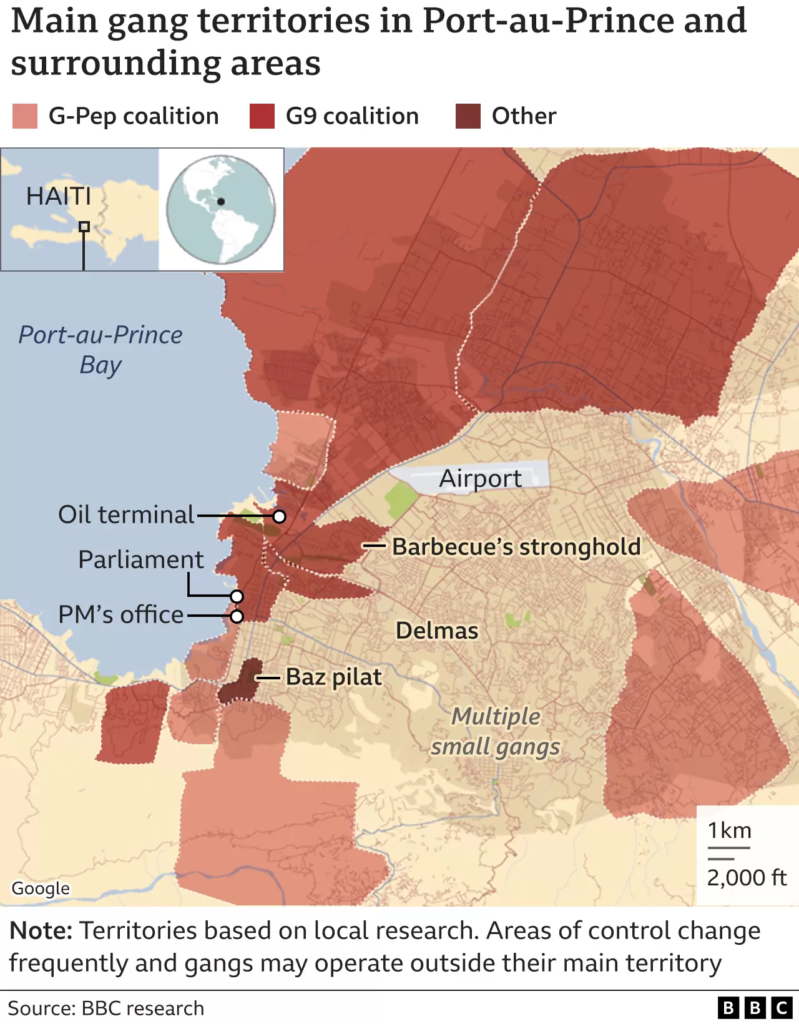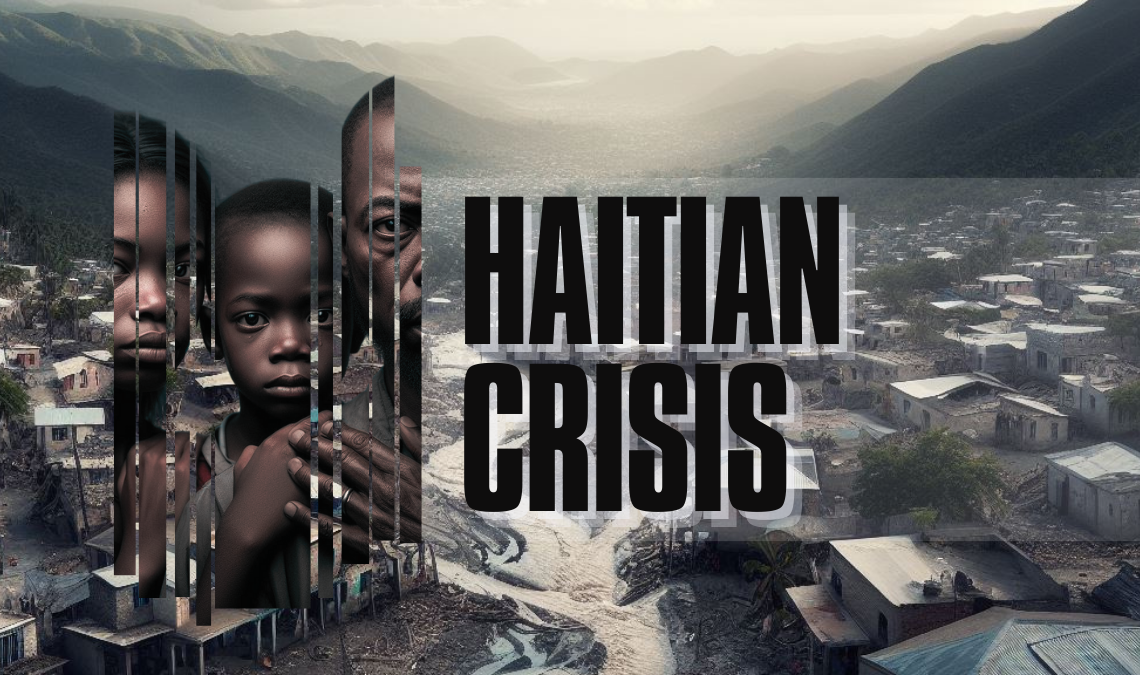Haiti, “the pearl of the Antilles”, has hadto contend with extreme political instability for several years now. Its capital, Port-au-Prince, is in the grip of gangs who kill, kidnap and rape on a daily basis, creating a climate of terror in the country. The parliament is dysfunctional, the last head of state, Jovenel Moïse, was assassinated in his home, and the police, under-equipped to deal with over-armed bandits, are powerless [1]. The people who live there have drawn up plans dividing the city into gang-free zones and zones where you should never venture. The slightest mistake can be fatal: over 60% of the city is controlled by armed factions who do not hesitate to kill men, women and children in cold blood [2]. Almost half the population is suffering from famine, and cholera has returned to the island [3]. In other words, Haiti is now facing one of the biggest crises in its history. ASSEDEL takes stock of the many human rights violations committed in the Caribbean country and the solutions put forward by the UN and experts.

The human rights situation in Haiti
In Haiti, “all human rights […] are being violated” said William O’Neill, Independent Expert on the situation [4]. The UN and Amnesty International have drawn up a list of these violations:
- Since October 2022, 2,800 murders have been recorded by the Office of the United Nations High Commissioner for Human Rights (OHCHR) [5];
- Between January and October 2022, more than 1,000 people were kidnapped by gangs [6];
- In October 2022, the OHCHR published a report highlighting the use of rape and other forms of sexual violence by gangs as a means of spreading terror and influence. In addition, people from the LGBTI+ community, who are often marginalised and rejected within Haitian society, have been particularly targeted [7];
- According to the World Food Programme, around 4.7 million Haitians are in a food crisis or emergency [8];
- According to Volker Türk, United Nations High Commissioner for Human Rights, one person in two in Haiti has no regular access to drinking water [9];
- Freedom of the press is also under serious threat. Human rights defenders and journalists operating on the island risk their lives to pursue their profession. In September 2022, two journalists investigating in Cité Soleil were murdered and their bodies set on fire, as reported by the Committee to Protect Journalists [10];
- Many Haitian asylum seekers have been forced to leave the country by sea, leading to drowning tragedies. [11].
A humanitarian intervention will take place
In addition to the violence itself, the UN deplores the impunity of gangs in the country. Among other things, the case of the assassination of the last president, Jovenel Moïse, is making no progress, and the insecurity of judges is a problem [12]. To deal with this dramatic situation, the United Nations Security Council authorised the dispatch of a multinational force to Haiti on 2 October [13]. The objectives: the rapid and lasting re-establishment of public institutions in gang-free zones, a thorough reform of the judicial and penitentiary system and the bringing to justice of the perpetrators of these crimes in Haiti [14]. It is also considered essential to strengthen international cooperation to step up border controls with a view to eradicating the illegal arms trade and trafficking [15]. This multinational force of police and military personnel will be led by Kenya [16].
An inadequate response?
While the Kenyan multinational force is a source of hope for the international community, some experts remain highly sceptical about the chances of success of the blue helmets in Port-au-Prince. ASSEDEL asked Jean-Marie Théodat – a lecturer at Panthéon-Sorbonne University and founder of the Laboratoire des Relations Haïtiano-Dominicaines – for his views on the matter.
“The Kenyan solution is neither sufficient nor credible”, says the expert. “Insufficient for several reasons. Firstly, because 1,000 police officers will not be enough to keep at bay the 150 gangs, made up of several dozen members, that are sowing terror in the Haitian capital; these police officers are not armed to take on individuals with an arsenal of war. What’s more, a one-year operation is not enough to pacify the scene. The previous UN mission lasted 13 years, with the result we know: as soon as the peacekeepers left, the gangs were back in action”.
“Not credible means that Haitians do not feel confident. Kenya appears to be the last available contender to lead the UN force after all the countries that could have, and should have, taken the lead on this issue for reasons of obvious geographical and historical proximity (e.g. the USA, France, Canada, Brazil, etc.). Kenya is doing so in exchange for substantial financial aid. Haiti appears to be a bargaining chip between the USA and a reliable ally. At a time when the USA is seeking to reposition itself in the Indo-Pacific, Kenya is a strategic anchor. What’s more, the previous stabilisation and intervention missions in which Kenya has been involved around the world (Kosovo, Sierra Leone, Somalia) have not been entirely effective in this area.
“To be credible, such a mission must be accompanied by a legal component to clean up the political, economic and social scene. The gangs are the manifestation of the mafia networks that have taken control of the metropolitan territory, and whose tentacles also extend to the provincial towns. The Augean stables must be cleaned out to make way for the new republic. If the Kenyan mission could help in this, it would be a miracle.
Laurent Dubois, in his article for MSNBC [17], is no more optimistic about the UN’s response. In his view, the situation in Haiti will only improve if the United States adopts a more open immigration policy. Historically, Haitians have been particularly badly treated by US immigration policy. They have rarely been granted refugee status despite the horrors they have faced [18]. Between September 2021 and May 2022 alone, the US authorities repeatedly used the “Title 42” mechanism to deport more than 25,000 individuals of Haitian origin to their country of origin [19]. Yet the adoption of a more open immigration policy would offer Haitians access to employment, security and educational opportunities that are very limited in their country of origin. The most effective form of foreign aid already comes from migrant remittances, which directly support Haitian families and communities. Contrary to popular belief, many Haitian migrants choose to earn money in the United States and then return home to invest in their native country. This phenomenon would spread if they were allowed to travel freely between Haiti and the United States. This lack of opportunities fuels the recruitment of young people into armed groups and keeps people trapped in a difficult situation [20]. Given the urgency of the problems in Haiti, it may seem paradoxical to focus on long-term decisions and policies. However, given the ineffectiveness of the UN’s actions between 2004 and 2017 and the concern surrounding the new Kenyan multinational force, it is necessary to imagine, right now, a political action that has a real chance of profoundly transforming the situation of the Haitian people.
[1] BBC (2022), “Haiti: Inside the capital city taken hostage by brutal gangs” https://www.bbc.com/news/world-latin-america-63707429
[2] BBC (2022); Le Monde (2023), “Le Kenya prend la tête de la future force en Haïti, à la demande des Etats-Unis” https://www.lemonde.fr/afrique/article/2023/10/02/le-kenya-prend-la-tete-de-la-future-force-en-haiti-a-la-demande-des-etats-unis_6192062_3212.html
[3] BBC (2022)
[4] ONU Info (2023), “La situation des droits humains en Haïti est dramatique, selon un expert” https://news.un.org/fr/story/2023/06/1136552
[5] Le Monde (2023), “Le Kenya prend la tête de la future force en Haïti, à la demande des Etats-Unis” https://www.lemonde.fr/afrique/article/2023/10/02/le-kenya-prend-la-tete-de-la-future-force-en-haiti-a-la-demande-des-etats-unis_6192062_3212.html
[6] BBC (2022)
[7] Amnesty International (2022), “Haiti: the human rights situation” https://www.amnesty.org/fr/location/americas/central-america-and-the-caribbean/haiti/report-haiti/
[8] ibid.
[9] ONU Info (2023), “La situation en Haïti est désespérée mais il est possible de renverser la donne, selon l’ONU” https://news.un.org/fr/story/2023/02/1132197
[10] Amnesty International (2022)
[11] ibid.
[12] Le Monde (2023), “Haïti : la situation de crise face aux violences, à l’impunité et à la corruption ” s’est encore aggravée “, selon l’ONU” https://www.lemonde.fr/international/article/2023/09/27/haiti-la-situation-de-crise-face-aux-violences-a-l-impunite-et-la-corruption-s-est-encore-aggravee-selon-l-onu_6191315_3210.html
[13] Le Monde (2023), “Le Kenya prend la tête de la future force en Haïti, à la demande des Etats-Unis” https://www.lemonde.fr/afrique/article/2023/10/02/le-kenya-prend-la-tete-de-la-future-force-en-haiti-a-la-demande-des-etats-unis_6192062_3212.html
[14] Le Monde (2023), “Haïti : la situation de crise face aux violences, à l’impunité et à la corruption ” s’est encore aggravée “, selon l’ONU”
[15] ibid.
[16] Le Monde (2023), “Kenya takes the lead of the future force in Haiti, at the request of the United States”.
[17] MSNBC (2023), “Haitians need an open door more than a military intervention”.
[18] ibid.
[19] Amnesty International (2022)
[20] MSNBC (2023)

